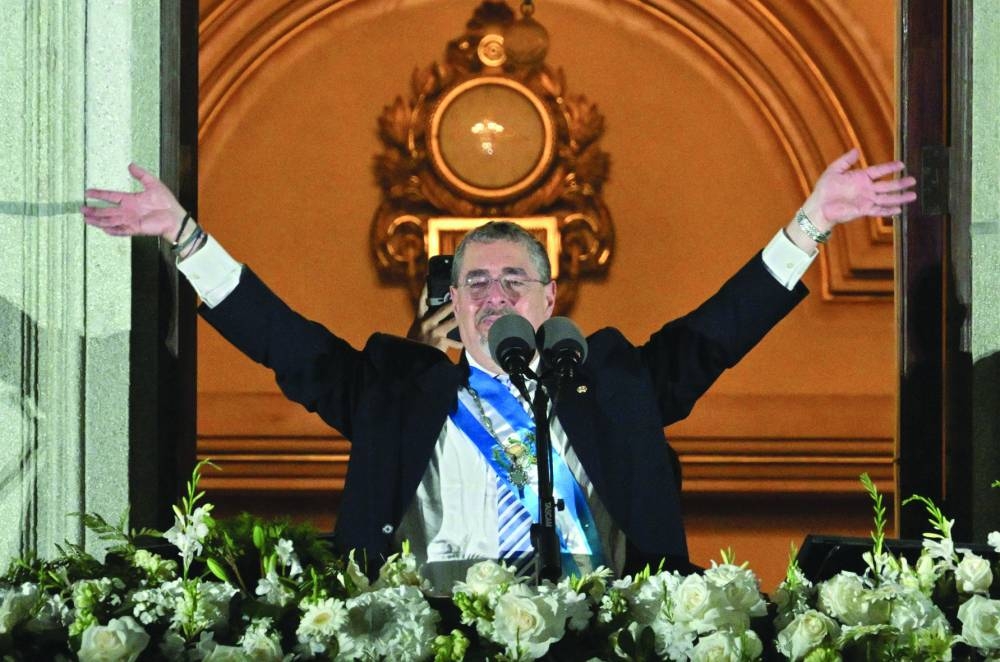Guatemala’s new President Bernardo Arevalo promised early yesterday to fight corruption and stand firm against global authoritarianism, in his first speech after being sworn in.
“We will not allow our institutions to be bent by corruption and impunity,” he said at the inauguration ceremony, held in Guatemala City more than nine hours late after a last-ditch effort by opponents to prevent the anti-corruption crusader from taking office.
The 65-year-old former lawmaker, diplomat and sociologist pulled off a major upset when he swept from obscurity to win elections last August, firing up voters weary of graft in one of Latin America’s poorest nations.
He took the oath of office after warding off a barrage of attempts to prevent him from taking power – notably by prosecutors who have been accused of graft and are closely aligned with the country’s entrenched political and economic ruling class.
The prosecutors had tried to overturn the election results and strip Arevalo, who enjoys strong support from the international community, of immunity from prosecution.
His Semilla (Seed) party had its registration suspended on fraud allegations widely seen as trumped-up.
The opposition-dominated Congress engaged in hours of tug-of-war on Sunday over the status of 23 suspended Semilla lawmakers.
They were finally accepted and the inauguration ceremony got underway around midnight.
With the presidential sash across his chest, Arevalo expressed hope in the face of “a wave of authoritarianism, the spread of intolerance, the restriction of dissent”.
“During these last months we have faced complex tensions and challenges that led many to believe that we were destined for an authoritarian setback,” he said, adding that Guatemala was now turning the page on a “painful passage of uncertainty”.
The inauguration was attended by EU foreign policy chief Josep Borrell, Colombia’s President Gustavo Petro and Spanish King Felipe VI.
Chile’s President Gabriel Boric had to leave before the ceremony, due to the lengthy delays.
US President Joe Biden sent congratulations from Washington, lauding Arevalo’s inauguration as “testament to our shared commitment to democracy and the will of the people”.
“We applaud the Guatemalan people for advancing the cause of democracy under challenging circumstances,” said US Secretary of State Antony Blinken in another statement.
In a nearby square, thousands of supporters had gathered to await the ceremony, waving flags in a festive atmosphere with music and dancing.
Indigenous Mayans lit incense and danced along to the rhythm of drums, celebrating the pending change in government.
Guatemala’s Indigenous community has spearheaded roadblocks and protests against the efforts to keep Arevalo from power.
In his inauguration speech, Arevalo pledged to Guatemala’s indigenous peoples “not to leave you behind” and vowed “no more discrimination, no more racism”.
More than 40% of Guatemalans are indigenous, mainly Maya.
Guatemala’s indigenous have historically suffered from discrimination and poverty, with 80% of their children suffering inadequate access to nutritious food according to UN studies.
“We have had mediocre, corrupt, scoundrel governments that do not have the slightest love for their country, and I hope that this government does not fail the people,” said Indigenous leader Alida Vicente, 43. “There is a lot of enthusiasm. There is a lot of hope from the population.”
Arevalo takes over from Alejandro Giammattei, under whom several prosecutors fighting graft were arrested or forced into exile.
Rights groups accused Giammattei of cracking down on critical journalists.
He was also accused of propping up Attorney-General Consuelo Porras, who headed the prosecutors’ campaign against Arevalo alongside senior prosecutor Rafael Curruchiche and Judge Fredy Orellana.
All three are listed as corrupt and undemocratic by the US Justice Department.
Giammattei did not attend the inauguration ceremony.
Guatemala, routinely ranked among the most corrupt countries in the world, is also one of Latin America’s most unequal countries – a reality that has, along with high rates of violent crime, compelled hundreds of thousands to risk the perilous migrant journey to the United States in hopes of a better life.
Arevalo is the son of reformist Juan Jose Arevalo, who in 1945 became Guatemala’s first democratically elected president after decades of dictatorship.
The chess-playing, jazz-loving polyglot is faces a tricky task.
To start with, he inherits an attorney-general who “attacked and criminalised” him and “threatened democracy to a degree we had not thought possible”, said Edie Cux of Citizen Action, a local version of Transparency International.
Arevalo himself has acknowledged there would be “difficulties, since these political-criminal elites, at least for a time, will continue to be entrenched in some branches of the state”.

President Bernardo Arevalo gestures to supporters from a balcony of the Culture National Palace in Guatemala City, after his inauguration ceremony, early yesterday.
